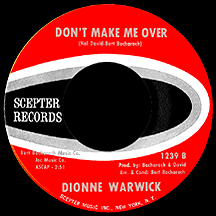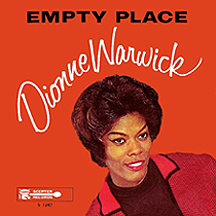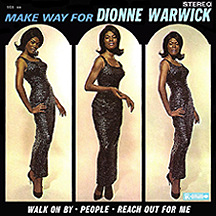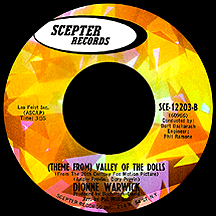DIONNE WARWICK
I'm sure that by now many of us have noticed what a demanding diva Dionne Warwick appears to be. I suppose where great artists are concerned, temperament often comes with the territory. She had an attitude from the beginning that has ultimately worked in her favor. Take the case of what was to be her first official session with Burt Bacharach and Hal David. Earlier, she had recorded a demo of their song "Make it Easy on Yourself." Certain it had hit potential, she wanted to run through it again and get it out as her first single. "Too late!" she was told; it had been done by Jerry Butler and was already climbing the charts. A heated argument ensued. She told Bacharach, "Don't make me over, man!" and stormed out of the building!
Burt and Hal could have ended it right there, but Scepter Records owner Florence Greenberg had taken a liking to her and Bacharach was convinced this young singer he'd met some months earlier, wearing jeans and pigtails while doing backing vocals on a session he was producing for The Drifters, had something special. Besides, that angry comment of hers had given them an idea for a song. When she returned at a later date, they presented her with "Don't Make Me Over," a romantically yearning piece quite different from the meaning Dionne had intended in the first place. She realized the joke was on her and launched into a performance that transformed this good song into a brilliant one. Released near the end of 1962, the debut single hit the top 40 in early 1963 and the relationship of Warwick, Bacharach and David was off to a solid start.
Marie Dionne Warrick was exposed to music and the record business during her childhood in East Orange, New Jersey. Her father, Mancel Warrick, had at one point been a promoter for the gospel division of Chess Records. Her mother, Lee Drinkard Warrick, was a member of gospel group The Drinkard Singers, based in Newark and most popular during the 1950s; Lee was also the group's manager for a time. Various family members were singers in the group during its peak years, including Judy Clay and Dionne's aunt, Cissy Houston. Dionne and her younger sister Delia sang with the choir at New Hope Baptist Church and occasionally joined in with the Drinkards.
In 1958, around the time Dionne graduated from high school, she and Delia joined two other girls and started their own group, The Gospelaires, appearing at New York's Apollo Theater to positive response. Houston and Clay were members at one point, as was Doris Troy, a friend from the Bronx. The Apollo appearance led to session work for the girls, who sang behind many top artists including the Drifters, Ray Charles, Bobby Darin, Dinah Washington and future Scepter/Wand Records star Chuck Jackson. Hit records were in the cards for the talented Gospelaires, as they later followed their own musical paths. Cissy stayed with the group, which evolved into The Sweet Inspirations, in demand for many years as backing singers for scores of acts including Aretha Franklin and Elvis Presley. They enjoyed a run of hits on Atlantic from 1967 to 1971, including the top 20 pop and top ten R&B hit "Sweet Inspiration," a soul-satisfyin' jam, in '68.
In the early '60s, Dionne gradually broke from the pack; in her twenties by this time, ego in check, her desire to make singing her life's work made her a regular at the local bus station, as she often commuted from East Orange to the Big Apple to perform as a backing singer on any recording session she could get. It was in late 1961, during the recording of the Drifters' "Mexican Divorce," written by Bacharach and Bob Hilliard, that Burt noticed her. He couldn't miss her, in fact, as he later recalled she had sung louder than anyone else in the room! He arranged for Dionne to make demonstration recordings, a step up by the young hopeful's standards and a new adventure she tackled with gusto. One demo wound up in the hands of Flo Greenberg, impressing her so much she said, "Forget the song! Get the girl!" Within a few months, Dionne was in the studio giving Bacharach flak and getting away with it.
That solid start I mentioned earlier? Well, it didn't seem so strong at first; "Don't Make Me Over" was pressed and put on the market before someone noticed her name had been misspelled "Warwick" instead of "Warrick." They stayed with what was shown, though it's unclear why; perhaps it was a time- and money-saving move or as simple a reason as the name Warwick is a little easier to say (they should have fired whoever typeset the label, because Bacharach's first name was misspelled as well, though he didn't make a change because of it). Dionne, fascinated by psychic phenoma since she was young, likely considered it a sign of her fate, seeing as how the song was a hit, so there would be no turning back on the issue of her professional name. Sister Delia began her own solo career in 1963 and went by the name Dee Dee Warwick, showing an acceptance for the altered spelling as well.
Then again, the sign may have meant nothing whatsoever as 1963 turned out to be a frustrating year. Follow-up "This Empty Place" (shown as "Empty Place" on the picture sleeve, suggesting the sloppy typesetter was still employed, thus continuing to upset the balance of the universe), made only a brief appearance on the charts, as did the third single, "Make the Music Play," a Drifters B side from earlier in the year, then titled "Let the Music Play." When it struggled out of the gate, Warwick began to suspect she was being handed second rate Bacharach-David material; other acts' leftovers, if you will. Sister Dee Dee was also experiencing a bumpy beginning; her first single, "You're No Good" on the Jubilee label, was overshadowed by Betty Everett's more popular version, though little sis went on to enjoy a long run in the mid-regions of the charts for the better part of the next decade, receiving her fair share of airplay on R&B stations (Dee Dee hit the R&B top ten twice, with "I Want to Be With You" in 1966 and "She Didn't Know (She Kept on Talking)" in 1970).
Then Burt and Hal came up with the song that sent Dionne to the next level. The haunting and emotional "Anyone Who Had a Heart," thematically in keeping with the first single, is considered by some to be the greatest recording of her career. Unleashed late in the year, it went top ten nationally in February '64. Dionne had arrived...in the U.S., that is, though trouble was a-brewin' in England. With the British Invasion under way as The Beatles had arrived at the exact time Warwick made her top ten breakthrough, many music fans in the States were paying more attention to the music scene in the U.K. and vice-versa. "Anyone Who Had a Heart" was released in England on the Pye label, yet before it could gain any traction, Liverpool chick Cilla Black, who'd previously had only one minor hit, leaped onto the charts and took her cover version straight to number one. Dionne's original stalled and she was incensed. Cilla had made a compelling record, nicely contrasting the original, but this didn't matter to Dionne...all she cared was that someone else's offshoot version had hit number one! Suffice it to say she wasn't pleased with what was going on overseas.
Back at home, though, she was on a roll. "Walk on By" came out next and where another singer might have balked at lyrics like 'If you see me walking down the street, and I start to cry each time we meet...,' Dionne's delivery cut deep. It spent the entire month of June '64 in the top ten and made the struggles of the previous year a distant memory. The song also became her first top ten in England, but she wasn't exactly overjoyed. It didn't hit number one like that "just-who-is-she-anyway" Cilla girl had done with her song! That first incident, though, was quickly forgotten when the pain hit closer to home. She began hearing a song on the radio by Dusty Springfield, the first female Brit of the era to invade the States. It was "Wishin' and Hopin'," which Dionne had already released a year earlier on the flip of "This Empty Place"...and the arrangement was almost exactly like her original take! Dusty's version, which wasn't released in her native country, went top ten in the U.S. in July. Dionne jumped all over Bacharach, Greenberg and the Scepter promotion staff; what was it with these girls from England stealing her songs? Why hadn't her version been chosen as an A side in the first place? When asked by a reporter how she felt about the success Springfield was having with a song she'd done first, Dionne gave a one-word answer: "Cheated!"
Florence Greenberg assured her that she was the label's top priority, and it was true; with The Shirelles' best days seemingly behind them, Warwick was the company's highest-flying hitmaker. Bacharach and David pledged their commitment while pointing out how difficult it was to predict which songs would be hits as well as their own need to have other artists perform their material. Still, the very next single brought further disappointment. "A House is Not a Home," Burt and Hal's title theme from the movie starring Shelley Winters, was performed in the film by Brook Benton, whose version also beat Dionne's to the charts. If they were so committed to her, why didn't she get the film theme nod? When her version faltered, Scepter promoted the flip side, "You'll Never Get to Heaven (If You Break My Heart)," and it hit the top 40 in September. Then she took on a song Burt and Hal had given to Lou Johnson, "Reach Out For Me" (a minor hit in the fall of '63), and it hit the top 20. As 1964 was coming to a close, instead of feeling joy, Dionne's doubts moved a notch closer to out-and-out paranoia.
17-year-old Sandie Shaw, another U.K. girl singer, seemed to come out of nowhere with the Bacharach-David song "(There's) Always Something There to Remind Me," which hadn't even been offered to Dionne (Johnson, instead, had released his version in August, landing mid-chart with it). By the end of October, Shaw's breakthrough was number one in England and also received a fair amount of stateside airplay in the latter months of '64. Warwick had been beaten by the British yet again! Her relationship with Bacharach, always a precarious one, was now strained to the limit. Word had trickled down that the U.K. record label heads preferred to see their own singers achieving success whenever possible (a point of view not surprising and understandable with the increased attention British acts were getting in the U.S. and many other parts of the world). This sort of thing only made Miss Warwick feel that much more victimized.
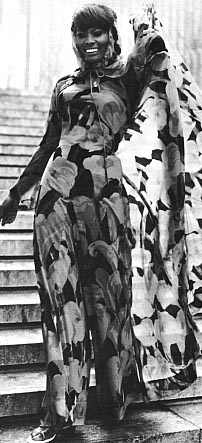
Then the hits stopped coming altogether and the Dionne Warwick name was reduced to a mere trivia question under the "Where Are They Now?" singers of years gone by. Okay, now I'm taking unfair jabs at the diva! Everyone knows, or should be aware, that she went on to achieve unprecedented success...but you probably wouldn't have predicted it in 1965. She had temporarily bailed out on Burt Bacharach, releasing "Who Can I Turn To," a Leslie Bricusse-Anthony Newley song from the Broadway musical The Roar of the Greasepaint, followed by "You Can Have Him," a gender-adjusted version of Bill Cook's "You Can Have Her," a hit in 1961 for Roy Hamilton; the session was produced in England with backing vocals by The Ladybirds. Meanwhile, Jackie DeShannon advanced to the big time with Bacharach and David's "What the World Needs Now is Love," but Dionne didn't hold any ill will towards Jackie, as she had been offered the song and passed on it. Still, it was enough for her to relent and resume her association with the writing duo, recording "Here I Am" (from What's New, Pussycat?) and "Looking With My Eyes," yet not one of her singles that year made it beyond the lower 40 of the Hot 100. If there was any consolation, it was that Cilla, Dusty and Sandie were experiencing similar difficulties in the U.S. at the same time. Back to England with them and good riddance!
Actually, one of the three offending songjackers, Dusty Springfield, made a spectacular return to the charts in the U.S. during 1966. As did Dionne Warwick, suggesting that the stars were aligning in even-numbered years and she could expect harder times during odd-numbered ones (an assessement that seemingly turned out to be true, at least a far as her biggest hits were concerned). "Are You There (With Another Girl)" made splendid use of Dionne's knack for conveying forlorn emotions and sent her into the top 40 in January 1966, the first time that had happened in over a year.
She continued recording whatever Bacharach and David offered her, and they gave her plenty of promising material to choose from. "Message to Michael" had been a hit in the U.K. in late '64 for Adam Faith as "Message to Martha." Her remake made the U.S. top ten in May '66. "Trains and Boats and Planes" had hit big in England and with less impact in America for Billy J. Kramer and the Dakotas; Dionne brought it home. A remake of Dusty's summer '64 U.K. hit "I Just Don't Know What To Do With Myself" was Warwick's fourth straight top 40 charter in 1966. Cilla Black hit the top ten in England that year with Burt and Hal's title tune from Alfie, the movie that made Michael Caine a star, though a version by Millicent Martin played over the end credits. In the U.S., Cher's version was used in its place (and hit the top 40 in the process). Dionne's rendition was a B side at first, until the film came up a top Academy Award contender. She was tapped to perform the song on the April 10, 1967 Oscar telecast, after which "Alfie" blew up and became one of her biggest hits. In less than a year she had released four Bacharach-David songs, all recorded first by a U.K. act, each a bigger hit by her. Now they would always be remembered as Dionne Warwick songs!
1967 went against the odd-year curse (noting that '66 and '68 were stronger years overall) with "Windows of the World" and the smash "I Say a Little Prayer," her biggest yet. Then in December, Valley of the Dolls was released to theaters, lambasted by critics but a huge box office success. The movie had one thing going for it: good music. Dionne's "(Theme from) Valley of the Dolls," the flip side of "Prayer," took the single up the charts a second time, where it spent part of February and most of March 1968 at number two, topping the single's A side as her new biggest hit yet. Written by the husband-and-wife team of Andre Previn and Dory Previn, it was the first hit in nearly three years that hadn't been written by Bacharach and David.
"Do You Know the Way to San Jose," a whimsical ride across the California map, came next. She has claimed she regretted doing it, an odd admission considering she picked up her first Grammy Award for the song in the category of Best Pop Vocal Performance, Female (winning over hard-to-beat Grammy favorite Aretha Franklin, nominated for her remake of Dionne's "I Say a Little Prayer"). Other hits in '68 and '69 included "Who is Gonna Love Me," "Promises, Promises" (from the Broadway production of the same name) and "This Girl's in Love With You," a female-perspective take on Herb Alpert's "This Guy's" original and her seventh career top ten hit in March 1969, just eight months after the Alpert version had been number one on the charts. She also took on the calamitous "(There's) Always Something There to Remind Me," and though her version wasn't a huge hit, it's commonly associated with Warwick, thus providing some closure to her hissy fit concerning Sandie Shaw, the last of the dreaded Brit-girl trio of one-uppers to get hers. Not that any of them were all that concered about, or even aware of, Dionne's obsessively competitive nature.
Her only other notable hit not written by Bacharach and David during this period was "You've Lost That Lovin' Feeling," the 1965 Righteous Brothers classic penned by Barry Mann, Cynthia Weil and Phil Spector. Fans welcomed Warwick's interpretation and it hit the top 20 in the fall of '69. She made her film debut that year, starring with Ossie Davis in Slaves, continuing with occasional film and television roles throughout the years. 1970 began with the top ten hit "I'll Never Fall in Love Again" from Promises, Promises, curiously released more than a year after the musical's title tune. She won her second Grammy for the song in the same category as the first. It was quite some time after that before she appeared again in the top ten.
Dionne left Scepter in 1971 and signed a big money contract with Warner Bros., where she promptly tanked, though why is not clear. Perhaps it was the one little, teeny-tiny change she made. One of her psychic advisers, Linda Goodman, convinced her that adding a small "e" to the end of her surname would balance the name and bring good luck her way. Many have derided the decision (including Dionne herself, eventually), but it depends on how you look at it. If the goal was to keep her career running consistently, it was a bad move. If the goal was more specific; say, to finally have the chart-topping hit that had proven so elusive to that point, it was a good move. In 1974, an even-numbered year, she teamed up with The Spinners for "Then Came You," and in October it became the first number one hit for both acts. Or one half of a number one hit for each, for those who see it that way. At any rate, three and a half days at the top of the charts. But it was the only major hit for Dionne Warwicke between 1970 and 1979. Also, sometime in the middle of the decade, she and Bacharach had a rift and stopped working together (they made up years later, though).
By the late '70s, she decided to confront the problem and make a life-changing, but relatively simple, decision: drop the e! Which she did...and success was hers again under the guidance of one of her chief admirers, Arista Records founder Clive Davis. The '80s were good to Dionne Warwick; she even had another number one hit, in fact the biggest single of 1986 (another even-numbered year!), when she recorded with Elton John, Gladys Knight and Stevie Wonder as Dionne and Friends, reaching four gigantic fan bases at once and captivating the rest with the Burt Bacharach-Carole Bayer Sager song "That's What Friends Are For."
Maybe it sounds like I'm being hard on Dionne. Perhaps that's true, but I'm a big fan and regularly listen to her music. Over the years I've read about these incidents of her disagreements with Bacharach, record executives and others, her obsessions with astrology and numerology leading to decisions that weren't always for the best, and of course those endless Psychic Friends infomercials that pulled in millions of customers as a result of her endorsement. In interviews and on television shows there was always an edginess about her. This is a strong woman who wants what she wants when she wants it and was even that way before she became a star. It's all okay by me; the music is what matters and hers is uniquely distinctive. Long live Dionne Warwick!
NOTABLE SINGLES:
- Don't Make Me Over - 1962
- This Empty Place /
Wishin' and Hopin' - 1963 - Make the Music Play - 1963
- Anyone Who Had a Heart - 1964
- Walk on By - 1964
- A House is Not a Home /
You'll Never Get to Heaven (If You Break My Heart) - 1964 - Reach Out For Me - 1964
- Who Can I Turn To - 1965
- You Can Have Him - 1965
- Here I Am - 1965
- Looking With My Eyes - 1965
- Are You There (With Another Girl) - 1966
- Message to Michael - 1966
- Trains and Boats and Planes - 1966
- I Just Don't Know What To Do With Myself - 1966
- Another Night - 1967
- The Beginning of Loneliness /
Alfie - 1967 - The Windows of the World - 1967
- I Say a Little Prayer - 1967 /
(Theme from) Valley of the Dolls - 1968 - Do You Know the Way to San Jose /
Let Me Be Lonely - 1968 - Who is Gonna Love Me? /
(There's) Always Something There to Remind Me - 1968 - Promises, Promises - 1968
- This Girl's in Love With You - 1969
- The April Fools /
Slaves - 1969 - Odds and Ends - 1969
- You've Lost That Lovin' Feeling - 1969
- I'll Never Fall in Love Again - 1970
- Let Me Go To Him - 1970
- Paper Mache - 1970
- Make it Easy on Yourself - 1970
- The Green Grass Starts to Grow - 1971
- Then Came You - 1974
by Dionne Warwicke and the Spinners - I'll Never Love This Way Again - 1979
- Deja Vu - 1980
- No Night So Long - 1980
- Friends in Love - 1982
by Dionne Warwick and Johnny Mathis - Heartbreaker - 1982
- That's What Friends Are For - 1986
by Dionne and Friends


